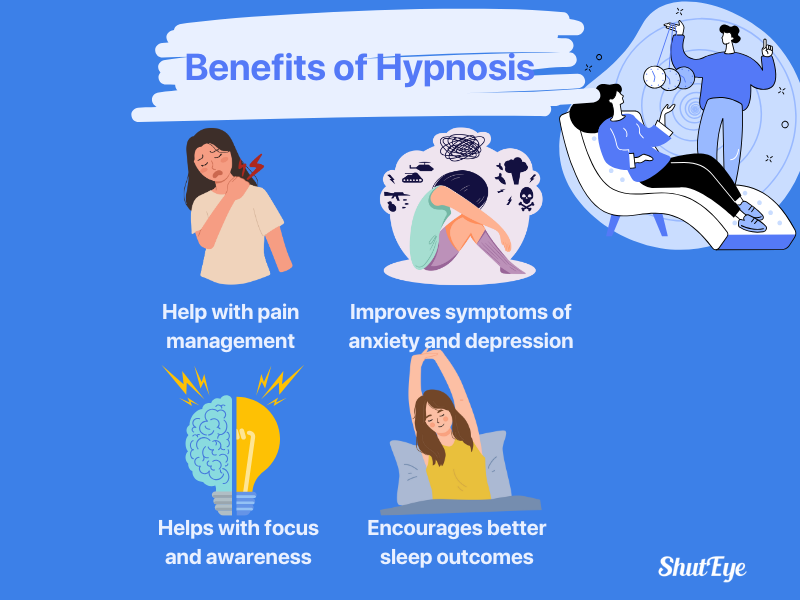


When you hear the word hypnosis, the first thought that probably comes to mind is that it involves controlling your mind. However, that is not the case. Hypnosis is a powerful tool that can put you in a state of deep relaxation, ideal for sleep.
Let’s explore deeper what hypnosis for sleep is, the benefits and types of hypnosis practices, and meditations for sleep.

Hypnosis can be seen as a meditative state in which you remain deeply relaxed and concentrated. During this period, you are likely less aware of your surroundings and more open to suggestions for behavioral or emotional changes [1], [2].
It is also sometimes used interchangeably with hypnotherapy. However, hypnotherapy is not a state but rather a form of therapy that can be used with other therapies for mental health conditions, post-traumatic stress disorder (PTSD), mood disorders, and even sleep disorders such as insomnia [3].
It is still not known how exactly hypnosis works but psychologists have found that hypnosis and meditation have similar neurophysiological effects. For both of them, fast-wave brain activity that affects thinking and processing would decrease while slow-wave activity during relaxation and focus increases [4].

Hypnosis can have positive effects on your overall health and well-being. Some of the benefits of hypnosis include [5]:
Hypnosis can be used to help with sleep problems by relaxing a person and putting them into a dream or trance-like state to reduce anxiety. Additionally, this would also result in the person being in deep sleep for longer [6].
If you are looking to try out hypnosis for sleep, one method is to use self-hypnosis. During self-hypnosis sessions, you can guide yourself into a state similar to meditation, where your subconscious mind becomes more receptive to new ideas and beliefs.
You can practice self-hypnosis by using guided meditation or visualization exercises. Here are 4 examples of sleep hypnosis meditations that you can try for yourself!
You may also consider consulting a therapist or sleep specialist if you find that hypnosis does not help and you continue to struggle with sleep problems such as insomnia.
In conclusion, hypnosis can be a valuable tool in improving a myriad of conditions including sleep disorders. It may also be combined with sleep hygiene practices or with sleep aids such as a white noise machine for increased benefits.
For more resources to help you sleep better, try the ShutEye® app for free. ShutEye® is a science-backed sleep-tracking app that also comes with sleep sounds, guided meditations, and more, to ensure a good night’s rest.
Cleveland Clinic (2022) Hypnosis [online]. Available at: https://my.clevelandclinic.org/health/treatments/22676-hypnosis
Psychology Today (2022) Hypnotherapy [online]. Available at: https://www.psychologytoday.com/sg/therapy-types/hypnotherapy
Royal College of Psychiatrists (2024) Hypnosis and hypnotherapy [online]. Available at: https://www.rcpsych.ac.uk/mental-health/treatments-and-wellbeing/hypnosis-and-hypnotherapy
Wilson, D. R. (2023) Can hypnosis help insomnia? [online]. Available at: https://www.medicalnewstoday.com/articles/hypnosis-for-insomnia
Weir, K. (2024) Uncovering the new science of clinical hypnosis. American Psychological Association. 55 (3): pg 47. Available at: https://www.apa.org/monitor/2024/04/science-of-hypnosis
Wolchover, N. (2011) How Does Hypnosis Work? [online]. Available at: https://www.livescience.com/33046-does-hypnosis-work-hypnotherapy.html